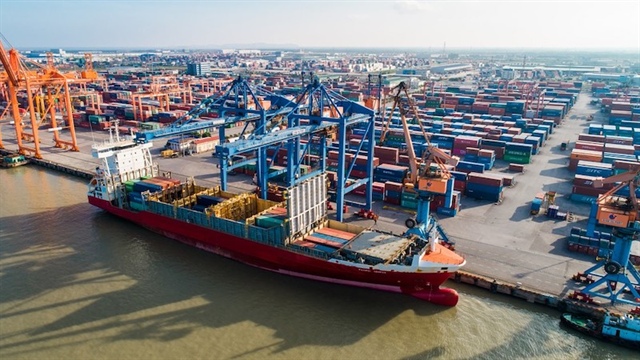Vietnam’s exports to hit $618 billion by 2030
Vietnam’s exports to hit $618 billion by 2030
The Southeast Asian country holds tremendous potential to be a global trading hub.
Vietnam is likely to earn US$618 billion in exports by 2030, with an annual growth rate of 7%, according to Standard Chartered.
"Vietnam will be a key driver of this global trade growth, outpacing the global average of 5% by a significant two percentage points," said the research report titled "Future of Trade: New opportunities in high-growth corridors".

Vietnam will be a key driver of this global trade growth. Photo: dinhvuport.com.vn |
The UK-based bank projects that global trade will reach $32.6 trillion with a growth rate of 5% by 2030. Trade corridors anchored in Asia, Africa, and the Middle East will outpace the global trade growth rate by up to four percentage points, driving combined trade volume to $14.4 trillion to account for 44% of international trade by 2030.
Mainland China, South Korea, and the US are expected to be Vietnam’s key trade partners in the coming years. Meanwhile, trade with India, Singapore, and Indonesia is forecast to experience robust growth from 2021-2030.
Growing global demand for electronics, investments, and sustainability initiatives will drive Vietnam’s key exports. “Vietnam holds tremendous potential to be a global trading hub,” said Standard Chartered Vietnam CEO Michele Wee.
The research included a survey of more than 100 global business leaders in 13 markets who shared the following as their top challenges: rising geopolitical conflicts and tensions (54%); high and volatile energy and commodity prices (52%); poor infrastructure quality (46%); high inflation (45%); sanctions, tariffs, export bans (44%).
By 2030, increased adoption of digital supply chain finance solutions could drive exports by 7.5% in the 13 surveyed markets, an uplift of $791 billion. Digital supply chain finance solutions can also help drive greater financial inclusion and participation for small and medium-sized enterprises, help companies track adherence to ESG criteria and reduce the risk of fraud and cost of monitoring, according to the bank.






















